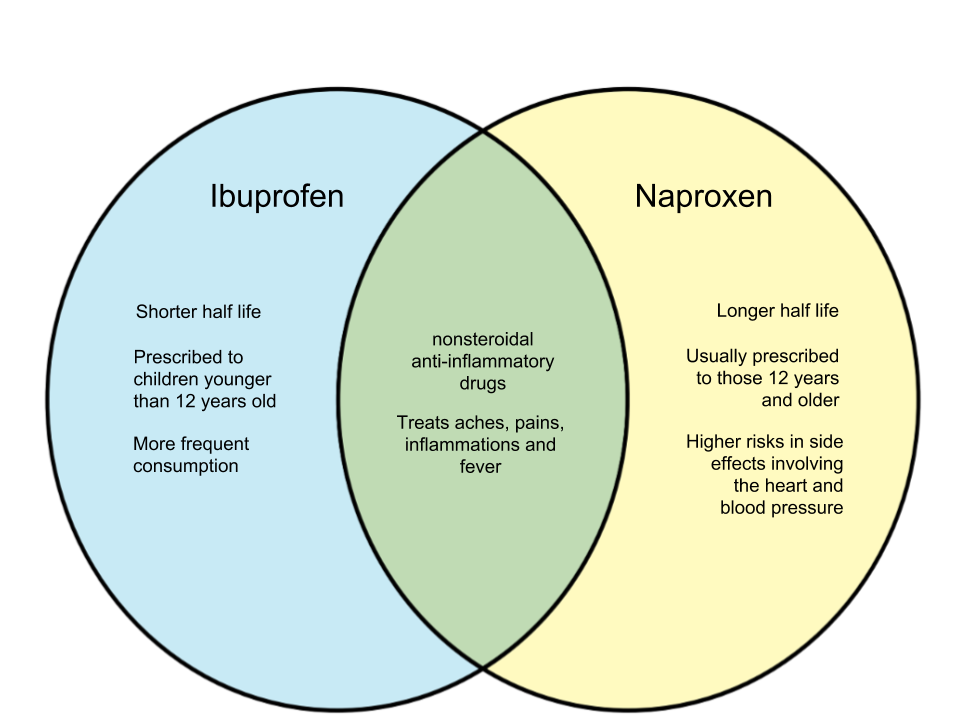
Ibuprofen and naproxen are both labeled as nonsteroidal anti-inflammatory drugs, or NSAIDs. They are similar in function, both serving as treatments to minor aches and pains by temporarily preventing the body from releasing prostaglandin by blocking the enzymes that produce them. Both medication also reduce fever and are relatively common in the market. However, there are certain distinctions between ibuprofen and naproxen.
One notable distinction between the two is that naproxen lasts longer than ibuprofen due to its longer half-life. Half-life is when half the original dose remains circulating in one’s bloodstream.
Ibuprofen can be taken by children and is usually the preferred prescription for those younger than 12 years old. Many brands are also designed so that they are easier to take for children.
Naproxen has the ability to interact with more drugs than ibuprofen, but carries more potential risk when it comes to side effects involving the heart and blood pressure.
Ibuprofen |
Naproxen |
|
|---|---|---|
| Definition | A synthetic compound and a nonsteroidal anti-inflammatory drug commonly used for treatment of pain, fever, and inflammation | A synthetic compound and a nonsteroidal anti-inflammatory drug that helps relieve pain, fever, swelling,stiffness, as well as arthritis |
| Treats | Toothaches, backaches, headaches, muscle aches, period cramps, common colds, fevers, arthritis | Toothaches, backaches, headaches, muscle aches, period cramps, common colds, fevers, arthritis |
| Forms | Oral/chewable tablets and gel capsules, liquid oral drops, liquid oral suspension | Oral tablets and gel capsules |
| Regular dose | 200 to 400 mg (for 12 years and up) | 220 mg |
| Frequency of taking the dose | Every 4-6 hours | Every 8-12 hours |
| Half-life | 2 to 4 hours (for 12 years and up) | 12 to 17 hours |
| Maximum dosage | 1200 mg (for 12 years and up) | 660 mg |
| Common side effects | Stomach pain, heartburn, indigestion, nausea, vomiting, constipation, diarrhea, gas, appetite loss, dizziness | Stomach pain, heartburn, indigestion, nausea, vomiting, constipation, diarrhea, gas, appetite loss, dizziness |
| Severe side effects | Stomach bleeding, ulcer, heart failure or attack, kidney failure, liver failure, stroke, high blood pressure, anemia, severe allergic reactions | Stomach bleeding, ulcer, heart failure or attack, kidney failure, liver failure, stroke, high blood pressure, anemia, severe allergic reactions (higher risks than ibuprofen esp. With stroke, heart issues, and blood pressure) |
| Usually prescribed to | Children below 12 years old | Individuals 12 years and above |
| Interaction with other drugs | Blood pressure medications, aspirin, diuretics, methotrexate, blood thinners | Blood pressure medications, aspirin, diuretics, methotrexate, blood thinners, antacids, medications for cholesterol treatment, drugs for depression |
| Brand names | Advil, Motrin, PediaCare Fever, Nuprin | Naprelan, Naprosyn, Anaprox, Aleve |
Venn Diagram
